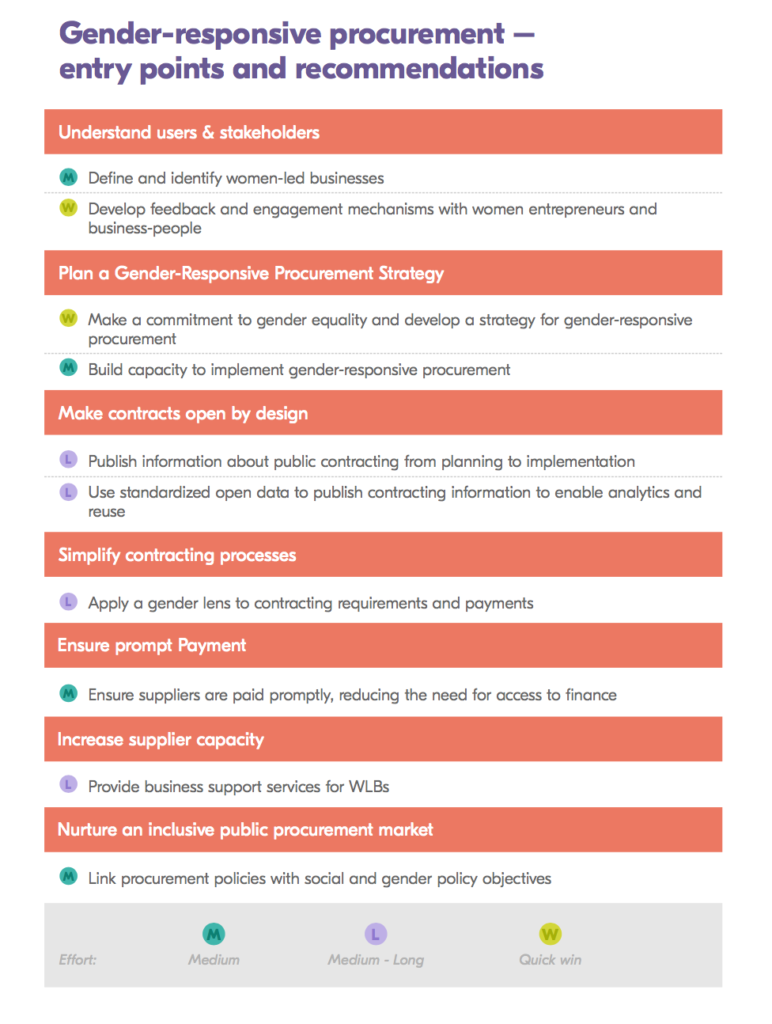Breaking the glass ceiling for women-led businesses in public procurement: fairness and inclusion through open contracting

Imagine you lead a successful accounting firm and want to bid on a government contract. You have heard that the government often pays for work several months after completed, so you would need a loan in order to apply. When you go to the bank, they ask to speak to your male business partner or husband. Without access to finance, you don’t apply for the contract.
Like this example, that we’ve heard many variations of in our research, there are generations of women entrepreneurs that have struggled to enter public procurement, a market worth 9.5 trillion dollars globally. And then there are those that don’t even bid because they feel they won’t be eligible, lack the time to fill out reams of paperwork, or think the winners are already decided.
Study after study has documented that women-led businesses are underrepresented among government suppliers. Together with Value for Women, we set out to investigate what exactly the challenges women face in public procurement are and which emerging practices are helping to promote fairness and inclusion.
Our research sheds light on the barriers women entrepreneurs face when dealing with public procurement, and what strategies can increase economic opportunities for women-led businesses. As governments explore how to restart the economy after the coronavirus pandemic, inclusive and gender-responsive procurement should be considered for a more equitable and sustainable recovery.
We reviewed existing research and spoke with 14 expert practitioners, including business people, civil society, academics, and government officials in Latin America to understand why women are discouraged and discounted as government suppliers. We also examined innovative procurement practices that promote women’s empowerment and inclusion, particularly the approaches of the City of Buenos Aires, the Dominican Republic, and Chile, which included open data and open contracting.
If you are eager to find out what we learned, please review the full research. If you are short on time, read a summary of the main challenges and recommendations in our key insights report.

The following three key insights will help empower women-led businesses:
To change it, count it
First, we need better data about women-led businesses. Without a baseline, it will not be possible to track progress. To understand the extent to which women (and other underrepresented groups) are participating in public procurement, governments need to agree which groups to track, how they should be defined, and collect and publish it as part of data about bidders and suppliers.
Engage with diverse communities
Secondly, engaging diverse stakeholders is a key pillar of open contracting. This research highlights how important it is to consult and solicit feedback from women-led businesses to identify innovative approaches for communities. In our interviews, this engagement was often limited to market research while the contract went to traditional players. The earlier this dialogue happens in the procurement, the better.
Accept the things you cannot change, but change the things you can
Finally, women-led businesses have difficulty getting access to finance due to bias and discrimination from banks. This might seem like a problem that is ‘bigger than public procurement’, but if governments pay contractors promptly, the need for access to finance is mitigated. Once you understand what the bigger problems are, look for the ways in which you can be part of the solution.
For the Open Contracting Partnership, empowering women-led businesses will continue to be a priority. So far, our research has mostly focused on Latin American examples. We will explore whether our findings about barriers and solutions are relevant in other regions of the world as well, including Africa, Asia and Europe. We will also embed what we have learned through this research into our technical assistance to country partners.
There is still a long way to go to provide a level playing field for women-led suppliers. Opening up the public procurement market will help to address systemic inequalities, find the best businesses to provide the best solutions and prove that gender-responsive procurement isn’t just the right thing to do, it makes good business sense.
This project would not have been possible without our former colleague Hera Hussain, who led the research and development.